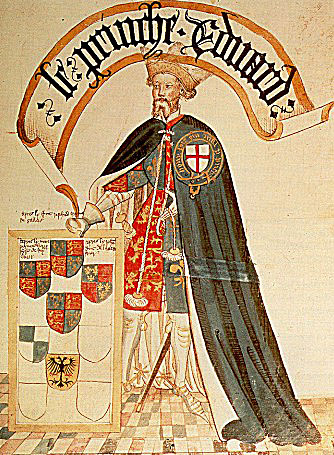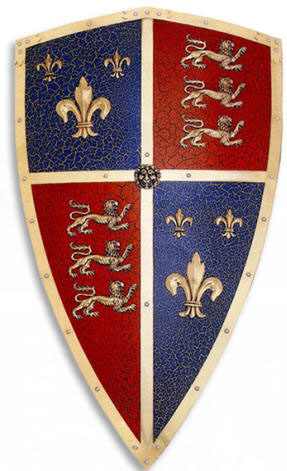
1312 - 1377
Rex: 1327 - 1377

The fifty-year reign of Edward III was a dichotomy in English development. Governmental reforms affirmed the power of the emerging middle class in Parliament while placing the power of the nobility into the hands of a few. Chivalric code reached an apex in English society but only masked the greed and ambition of Edward and his barons. Social conditions were equally ambiguous: the export of raw wool (and later, the wool cloth industry) prospered and spread wealth across the nation but was offset by the devastation wrought by the Black Death. Early success in war ultimately failed to produce lasting results. Edward proved a most capable king in a time of great evolution in England.
Edward's youth was spent in his mother's court and he was crowned at age fourteen after his father was deposed. After three years of domination by his mother and her lover, Roger Mortimer, Edward instigated a palace revolt in 1330 and assumed control of the government. Mortimer was executed and Isabella was exiled from court. Edward was married to Philippa of Hainault in 1328 and the union produced many children; the 75% survival rate of their children - nine out of twelve lived through adulthood - was incredible considering conditions of the day.
War occupied the largest part of Edward's reign. He and Edward Balliol defeated David II of Scotland and drove David into exile in 1333. French cooperation with the Scots, French aggression in Gascony, and Edward's claim to the disputed throne of France (through his mother, Isabella) led to the first phase of the Hundred Years' War. The Naval Battle of Sluys (1340) gave England control of the Channel, and battles at Crecy (1346) and Calais (1347) established English supremacy on land. Hostilities ceased in the aftermath of the Black Death but war flared up again with an English invasion of France in 1355. Edward, the Black Prince and eldest son of Edward III, trounced the French cavalry at Poitiers (1356) and captured the French King John. In 1359, the Black Prince encircled Paris with his army and the defeated French negotiated for peace. The Treaty of Bretigny in 1360 ceded huge areas of northern and western France to English sovereignty. Hostilities arose again in 1369 as English armies under the king's third son, John of Gaunt, invaded France. English military strength, weakened considerably after the plague, gradually lost so much ground that by 1375, Edward agreed to the Treaty of Bruges, leaving only the coastal towns of Calais, Bordeaux, and Bayonne in English hands.
The nature of English society transformed greatly during Edward's reign. Edward learned from the mistakes of his father and affected more cordial relations with the nobility than any previous monarch. Feudalism dissipated as mercantilism emerged: the nobility changed from a large body with relatively small holdings to a small body that held great lands and wealth. Mercenary troops replaced feudal obligations as the means of gathering armies. Taxation of exports and commerce overtook land-based taxes as the primary form of financing government (and war). Wealth was accrued by merchants as they and other middle class subjects appeared regularly for parliamentary sessions. Parliament formally divided into two houses - the upper representing the nobility and high clergy with the lower representing the middle classes - and met regularly to finance Edward's wars and pass statutes. Treason was defined by statute for the first time (1352), the office of Justice of the Peace was created to aid sheriffs (1361), and English replaced French as the national language (1362).
Despite the king's early successes and England's general prosperity, much remained amiss in the realm. Edward and his nobles touted romantic chivalry as their credo while plundering a devastated France; chivalry emphasized the glory of war while reality stressed its costs. The influence of the Church decreased but John Wycliff spearheaded an ecclesiastical reform movement that challenged church exploitation by both the king and the pope. During 1348-1350, bubonic plague (the Black Death) ravaged the populations of Europe by as much as a fifty per cent. The flowering English economy was struck hard by the ensuing rise in prices and wages. The failed military excursions of John of Gaunt into France caused excessive taxation and eroded Edward's popular support.
The last years of Edward's reign mirrored the first, in that a woman again dominated him. Philippa died in 1369 and Edward took the unscrupulous Alice Perrers as his mistress. With Edward in his dotage and the Black Prince ill, Perrers and William Latimer (the chamberlain of the household) dominated the court with the support of John of Gaunt. Edward, the Black Prince, died in 1376 and the old king spent the last year of his life grieving. Rafael Holinshed, in Chronicles of England, suggested that Edward believed the death of his son was a punishment for usurping his father's crown: "But finally the thing that most grieved him, was the loss of that most noble gentleman, his dear son Prince Edward . . . But this and other mishaps that chanced to him now in his old years might seem to come to pass for a revenge of his disobedience showed to his in usurping against him."

From Testamenta Vetusta, Being Illustrations from Wills, of Manners, Customs, &c., vol. 1, pp. 12-13. Nicholas Harris Nicolas, Barrister at Law, Fellow of the Society of Antiquaries. London: Nichols & Son, 1826.

From Testamenta Vetusta, Being Illustrations from Wills, of Manners, Customs, &c., vol. 1, pp. 10-12. Nicholas Harris Nicolas, Barrister at Law, Fellow of the Society of Antiquaries. London: Nichols & Son, 1826.
Return to Persona Historiae
Return to Pagina Artis
Return to Bruce and Bobbie's Main Page.